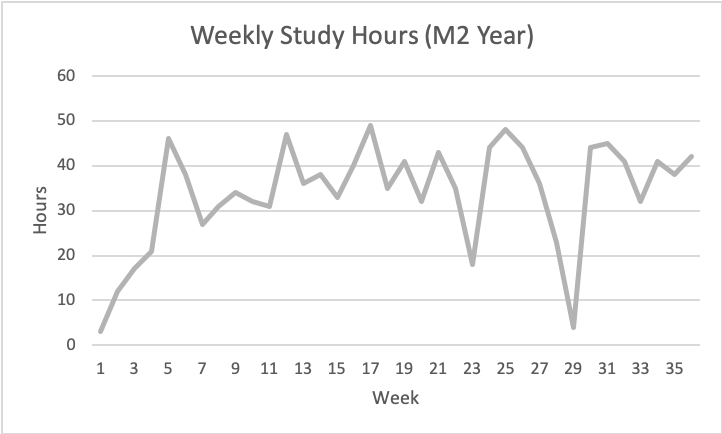The Numbers: How Many Hours Do You Study in Medical School?
This is truly the quintessential question of medical school, and if you’re like me you’re probably curious how all those hours of studying stack up. Lots of rumors & approximations float around in online forums, but I wanted to take a more quantitative approach to the question. The solution? I made myself the test subject and tracked my studying as an M1 and M2.
A bit about me: I go to a US medical school with a 1.5-year preclinical curriculum which culminates in taking Step 1 before entering clinical rotations. Throughout this curriculum I’ve kept track of every single time I sat down to study or do anything related to classes. Every single time. Originally it started as a way to keep track of my productivity, but over time it led to some interesting insights about study habits & burnout. It was interesting for me to analyze the numbers, and I hope it can help future students get a better idea of what the time commitment is like while in school.
Data Collection
I used an app on my iPhone (ATracker) to record my study sessions, and I counted anything related to school. This includes both class time, group sessions, and independent study. I generally didn’t count extracurriculars in order to keep things consistent. When studying I used a modified Pomodoro technique to stay focused, which entailed working for 40 minutes and then taking 10 minutes off. This means that the study time recorded here was focused. You’ll often hear people say they’re spending 12 hours studying in the library, but much of that total is unfocused, especially if they’re being social & getting distracted on social media. Using the Pomodoro technique kept me productive and ensured that the numbers recorded were “true” study hours.
How I Studied
Study methods vary drastically between medical students, so it’s important to keep this in consideration while looking at the numbers. Some students slacked off at the beginning of a class & then crammed at the end, but I preferred to study on a consistent basis everyday. I also quickly figured out that I didn’t need to go to class during the preclinical years, so most of my time was taken up self-studying via Boards & Beyond video lectures and doing flashcards on Anki. Anki is a fantastic tool for medical school school, but it certainly does take up a lot of time since you’re using spaced repetition to continually review concepts. Overall I feel like my slow & steady approach to studying helped me retain the content well and I became much more efficient as time went on. I’ll also be honest and say that I put a lot of work into school and possibly studied more hours than the average student.
Results
The author’s monthly study hour totals for the M1 & M2 school years.
Total = 2336.7 hours
Maximum = 190 hours/month (December 2019)
Minimum = 13 hours/month (June 2019)
In total I spent 2336.7 hours studying throughout the first two years of medical school. I spent the most hours studying (190 hours) in December 2019 as I was nearing the end of my M2 classes and was balancing class & boards studying at the time. Predictably my lowest full month (13 hours) was in June 2019 during the summer between my M1 and M2 years.
You can see a significant, gradual increase in monthly study hours during each semester. The one except to this is November 2019 when I had surgery. It’s also very clear that M2 requires significantly more study time than the M1 year. Despite this the hours seemed pretty reasonable overall compared to a normal 9-5 job. The big exception to this though is that these study hours are very mentally taxing, so it’s difficult to consistently put in a true 8 hours of study each day.
Weekly study hours during the M2 year. Note that the dip around weeks 27-29 is due to the winter holidays & some vacation time.
It was also very interesting to look at the weekly totals of my study hours. I found that I’d often push myself one week & then subconsciously have to reel it in the next week to recover. This results in the peaks that reach around 50 hours with a handful of weeks separating each. These peaks actually came well before tests as I’d usually take it a bit easier the week before. After a while I began to determine how many hours I could push it in a given day or week before burning out, and this really helped me keep studying sustainable. I’d encourage people to try tracking this on their own as well – the data can give you some powerful insights.
Also, a quick little plug for wellness here. I initially started school of by doing a little work each day of the week, but never truly had a day off. Now I’m a big proponent in setting aside one day of the week where you don’t touch or even think about school. It’s really a game changer & cuts down on the burnout quite a bit.
Conclusion
Medical school takes a large amount of time and effort. There’s really no way to get around that. It’s not that the material is all that difficult, but there’s just so much of it to consume. I found tracking my studying not only helped me increase my productivity in school, but also helped me better realize why & when I was feeling burnt out. If you’re entering medical school I hope this gives a small snapshot of what the time commitment might be, and if you’re already in school I hope this can give you a framework to objectively look at your study habits.
Questions, comments, personal experiences? I’d love to hear them in the comments below.



